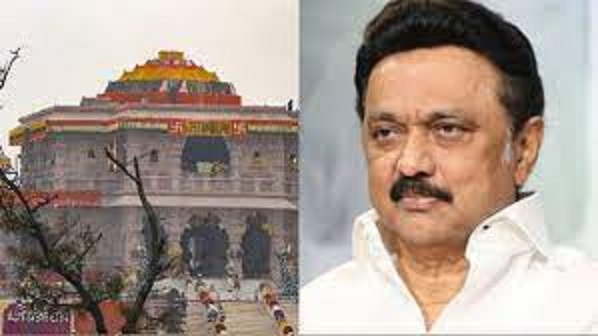New Delhi/Chennai: The Supreme Court on Monday termed “atrocious” the reasons given by the Tamil Nadu Police while rejecting an application by a local temple in the state’s Dindigul district seeking permission for almsgiving (annadanam) in connection with the Ram Mandir Pran Pratishtha event.
The bench presided by Justice Sanjiv Khanna was hearing a pea which alleged that on January 20, Tamil Nadu Chief Minister M K Stalin had “issued oral orders/Directions to the Police Department not to permit any kind of Poojas, Archanas, Annadhanam, Live Telecast of Pran Prathishta, Bhajans and processions in the name of Lord Ram on the auspicious occasion of “Pran Prathista” of Lord Ram at Ayodhya, in all the Temples in the State of Tamil Nadu irrespective of whether it is a Private Temple controlled by the TN HRCE Department”.
“If the order on page 21 (of the petition) is to be made applicable across Tamil Nadu, wherever there are minorities, they will never be able to hold a prayer meeting… See the reason. Here the Hindus are in the minority, if they are given permission to hold this prior meeting that will cause problems in the society. Is this a reason?” asked Justice Dipankar Datta, who was part of a two-judge bench.
“You regulate it, you have the power. You have the power to pass orders regulating all these processions. But this reason is atrocious,” Justice Datta added.
He expressed his gratitude and said the “wait of thousands of Kar Sevaks and Ram devotees” has been completed today. “…I express my gratitude to all the kar sevaks who have been struggling for centuries for this temple of Lord Shri Ram and those who have made sacrifices. Many thanks to the respected Prime Minister who has proved his commitment to cultural renaissance in building a new India! Respectful gratitude to him on behalf of all the countrymen!”
He stressed that the construction of a “grand-divine temple of Maryada Purushottam Lord Shri Ram Ji, who is adored by millions of Indians, is an important step in India moving towards Ramrajya”.
The counsel appearing for the Tamil Nadu Government told the bench that “no such oral directions”, as alleged by the petitioner Vinoj P Selvam, a state BJP functionary, had been issued and there is no ban on the live telecast, performance of poojas, archanas, annadanam, and bhajans on the occasion of Ram Mandir Pratishtha in Ayodhya”. He termed the plea as politically motivated.
The court recorded the state’s submission that there is no ban as alleged, in its order.
Issuing notice on the plea to the Tamil Nadu government, the SC asked it to record reasons for accepting or rejecting applications seeking permission and to keep data on the same.
“We believe and trust that authorities will act in accordance with law and not on the basis of any oral instructions… The authorities, while examining any application for permission et cetera shall proceed in accordance with law and record reasons if any, while rejecting the said application. Authorities will also maintain data with regard to the applications received, and the reasons given for allowing or allowing such applications. While examining such applications, the authorities will keep the relevant parameters as held by this court,” the bench said in its order.
What angered the court was the reply of the deputy superintendent of police, Dindigul Rural Sub Division, Dindigul district, to an application by the administrators of Sri Bhagavatiyamman Temple, seeking permission to give special almsgiving (Annadanam) on the occasion of the Ram Mandir Pran Pratishtha.
Among other things, the police note said, “The area of A Vellodu village, where you have requested permission to conduct the event, is predominantly inhabited by Christians. Additionally, there are areas with Christian temples. Due to the lower number of Hindu residents in this village, there is a possibility of encountering cultural sensitivities or legal complications related to public peace and morality when organizing events that are perceived as deviating from the prevailing religious practices”.
“Also, public peace is likely to be affected by the programme proposed to be conducted and law and order problems are likely to arise. Religious problems also are likely to arise and public property is likely to be damaged, and the public is likely to be put to discomfort. Therefore, due to the above reasons, permission is denied for the program you want to conduct”.
Disapproving of this, Justice Khanna also said while law and order can be a reason to regulate, what is stated in the order alone can’t be the reason. “We have made it very clear. We want to know the reason. If this is the reason going to be given, you will be in trouble,” Justice Khanna cautioned the Tamil Nadu counsel.
Solicitor General Tushar Mehta informed the bench he was told some police stations have passed written orders and added that a message must go from the highest constitutional court that what is happening is not acceptable.







